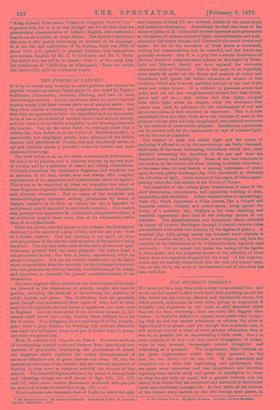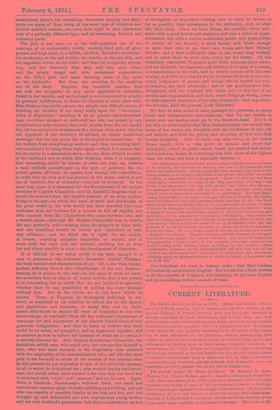NOT WITHOUT THORNS.*
\Vs have not for a long time read a story we so entirely like; and we do not feel moved to find much fault with anything except the title, which has not only an affected and sentimental sound, but which greatly underrates its own story, giving an impression of triviality and slightness in the trials so ably described which they are far from deserving ; they are more like daggers than thorns. It would be difficult to express more praise than by say- ing that we feel the utmost reluctance to criticise the story or begin to pull it to pieces; and yet though this is strictly true, it will perhaps convey a sense of even greater admiration than is due to, or possible for so unpretending a little work. But it is very complete in its way,—of even power throughout, or rather, what is very unusual, increasingly careful, thoughtful and interesting as it proceeds. We congratulate Miss Graham on the great improvement which this story presents on her last, She was Young and He was Old. If the characters and situations are a little less captivating and picturesque, they are much more numerous and leas exceptional, and therefore requiring more careful study and power of description to rouse as they do, not only an equal, but a greater interest, and the ability with which they are conceived and sustained is distributed much more uniformly amongst all. In fact, while all the interest of the. former story centred in the two foreign-bred sisters, so
* Not Without Thorns. By Emits Graham. London: TinaleyBrnSham.
anomalously placed, the remaining characters playing but slight parts—so many of them being of the same type of frivolous and shallow mischief-makers—we have here eight or nine characters each of. a perfectly different type, and all sustaining distinct and necessary parts.
The plot is not new,—it is the -well-approved one of the marriage of an enthusiastic, lovely, country-bred girl, of great powers and high ideal, to a selfish, shallow, fastidious aristocrat ; the awakening to the sad reality ; the cruelty on the one side, and the impulsive action on the other ; and then the temporary separa- tion, and the discovery that they still love each other, and the calmly happy end, with moderated expectations on the wife's part, and some dawning sense of her value on the husband's. But there are novelties in the working
out of the story. Eugenia, the beautiful heroine, does not seek the sympathy of any more appreciative masculine friend in her trouble, and her husband is not stimulated to cruelty by personal indifference, or desire for freedom or some other wife. Miss Graham has boldly chosen the simple and difficult course of building the troubles of her story solely upon the "incompati- bility of disposition," assisting it by no painful misunderstand- ings, no letters stopped or delivered too late, nor indeed by any complications more unusual than such as arise from the too candid but not too scrupulous revelations of a jealous elder sister, who has not approved of her brother's ill-advised, or rather unadvised marriage—for the real pinch lies in his neglect to consult her. So far, indeed, from complicating matters and then inv enting intri- cate machinery to bring them right-again--which is a system that has its merits in a sensational story—we are often obliged to smile at the barefaced way in which Miss Graham, when it is necessary that something should be known or some one tarn up, invents a most unlikely eavesdropper on the spot, or produces the re- quired person off-hand, no matter how strange the coincidence, in order that the true and real purpose of the story—which is not one of incident, but of character—may not be hindered. In the same way, since it is necessary for the development of the mutual relations of Captain Chancellor and his beautiful Eugenia that he should be removed from the humble position of an army captain living on his pay—in which the want of style and knowledge of the great• world in his wife would not have troubled him—our authoress does not hesitate for a minute to kill off rapidly, one after another, three Mr. Chancellors who come between him and a landed estate—although Mr. Herbert Chancellor was in middle life and perfectly well—making them die properly in their beds, and not troubling herself to invent gun explosions or rail- way collisions ; and we think she is right, for she avoids, of course, anything palpably impossible or absurd, and it saves both her time and her readers', enabling her to keep her real object steadily in view,—the development of character.
It is difficult to say which study is the best, though it is eau to pronounce the authoress's favourite, Gerald Thurston, the least natural and characteristic of all. He is the wise, tender, modest, suffering friend who subordinates all his own desires— bearing on in silence to the end—to the good of those he loves ; the secondary hero in almost all ladies' novels, who is too perfect to be interesting, but so useful that we are inclined to speculate whether there be any possibility of pulling the story through without him. But of the others we do not know which to choose. There is Eugenia, so thoroughly believing in her lover, so surprised at his inability to follow her in her dreams and aspirations and interests, so ready first and so deter- mined afterwards to ascribe all want of sympathy to her own shortcomings, so resolutely blind till her husband's expressions of contempt for and annoyance at her dearest friends rouse all her generous indignation ; and then so hasty to believe that there could be no union, no sympathy, and no happiness together, and so anxious at once to relieve her husband of what she is certain is a terribly irksome tie. And there is Beauchamp Chancellor, the fastidious, selfish man, who could love, but not sacrifice himself to love, who was more annoyed at the singularity than charmed with the originality of his unsophisticated wife, and who felt more pain in her betrayal to others of the novelty of her position than he did pleasure in her expression to him of her child-like pleasure in all to which he introduced her ; who -wanted beauty and sweet- ness, but would rather have wanted it for ever than not have had .it combined with "style" and" manner," and aufaitness. Again there is Gertrude, Beauchamp's widowed sister, too small and narrow and common-place to resist meddling and tattling, and yet who was capable of unselfish loyalty to her kith and kin, and had brought up and befriended her own impecunious young brother and her rich husband's portionless half-sister—mistakenly spoken
of throughout as step-sister—taking care to exact in return, as far as possible, their submission to her authority, and, in after life, their help. Then we have Roma, the sensible, clever half- sister, with a good deal of self-assertion, and just a touch of super- ciliousness, but with a nature sufficiently gentle and sympathetic to attract all her friends ; a mind honest and brave enough to open their eyes to see their own faults and their friends' virtues ; and a head sufficiently clear to see where they clashed, and to teach them to steer more wisely for the future. Of the subsidiary characters, Eugenia's good little common-place sister, and her husband, the dogmatic, self-satisfied little prig of a curate, so conscientious in his work, and so utterly content with his own wisdom and with the rules by which he forms his shallow and con- ceited judgments of people and things utterly beyond his com- prehension, are both admirable ; and so are good-natured Mrs_ Dalrymple, and her husband who takes care to slip out of all trouble and responsibility, and then, when things go wrong, comes in with oracular reminders of his wise prophecies ; and, especially, the brusque, kind old peeress, Lady Hereward.
We find we have noted so many passages for quotation, so many lively and characteristic conversations, that we are unable to- select, and our readers must go to the fountain-head. But it is not only in conversation that Miss Graham shines, nor merely that many of her scenes are beautiful with the tenderness of real joy and sorrow, and with the giving and receiving of true and deep human sympathy. Miss Graham can also write, as she makes Roma speak, with a wise spirit of patient and every-day philosophy, suited to guide others beside the exalted and enthu- siastic natures, weary of everything that falls short of the highest ideal, for whom this book is especially written:—
" She had learnt a good deal, she was learning every day more and more of the wisdom, the necessity of making the best of the materials with which she had to work ; slowly, painfully was coining home to her the interpretation of the dream, the lesson of the great life's trial' in which so rashly, so ignorantly she had engaged. 'Love' for her had not been clear gain,' viewed by the light of the dim knowledge of to-day ; but in the wiser afterwards the sun will pierce ;' the follies, the failures, the mistakes, the delusions will be lost in the beautiful whole, may indeed prove to have been essential to its perfection. Not that Beau- champ Chancellor's wife said or thought all this to herself ; she specu- lated and theorized and philosophized much loss than of old ; she lived more in the present, taking life, as we all must take it sooner or later, if it is to be endurable at all, in a day-by-day fashion, leaving the huge mounds of years,' the bewildering mazes of whys and wherefores, past and future, to be considered by-and-by,'—by-and-by, when surely we shall see things somewhat more clearly, more justly, more divinely, but a by-and-by which will never come to us if, dissatisfied with the fair promise of its far-off beauty, we seek to grasp its shadowy substance before the time. So. in a sense—must it not always be but in a sense? —Eugenia was happy. Happier perhaps possibly, because she thought less about being happy than in the old days. She had seen before her in imagination a dreary road;, to her surprise, ever and again, -as she walked along, fresh flowers began to spring by the wayside,—little unobtrusive blossoms, hardly distinguishable till her foot had all but crushed out their tender life ; tiny buds of brightness and sweetness, bringing many an unexpected spot of colour or breath of fragrance into her daily life."
One amplaint we must in honesty make ; that Miss Graham will not study more correct English. Her's reads like a book written in all the counties of England, and adopting all the loose Englisn and provincialisms current in each of them.



































 Previous page
Previous page